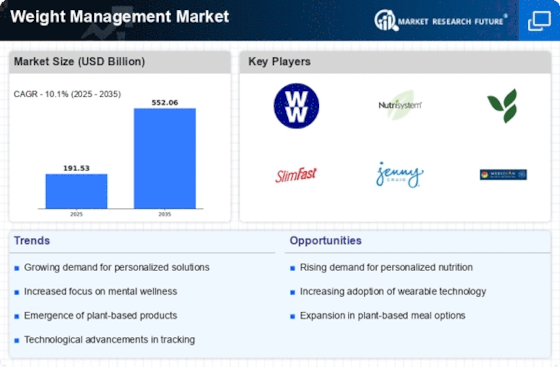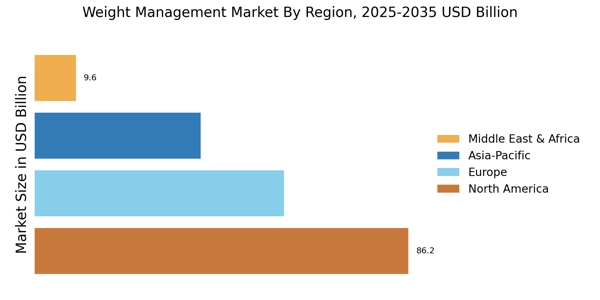Rise of E-commerce
The rise of e-commerce has significantly impacted the Weight Management Market, providing consumers with convenient access to a wide range of weight management products. Online platforms enable consumers to explore various options, compare prices, and read reviews, which enhances their purchasing experience. Recent data indicates that online sales of health and wellness products have increased by 25% in the past year alone. This trend is expected to continue as more consumers prefer the convenience of shopping from home. Consequently, businesses in the weight management sector are increasingly investing in their online presence to capture this growing market segment.
Increasing Obesity Rates
The rising prevalence of obesity is a primary driver in the Weight Management Market. According to recent statistics, approximately 36% of adults are classified as obese, which has led to a heightened awareness of health and wellness. This alarming trend has prompted individuals to seek effective weight management solutions, thereby expanding the market. The increasing incidence of obesity-related health issues, such as diabetes and cardiovascular diseases, further emphasizes the need for weight management products and services. As consumers become more health-conscious, the demand for weight loss programs, dietary supplements, and fitness solutions is likely to surge, indicating a robust growth trajectory for the Weight Management Market.
Technological Advancements
Technological advancements play a crucial role in shaping the Weight Management Market. The integration of mobile applications, wearable devices, and online platforms has transformed how individuals approach weight management. These technologies provide users with personalized insights, tracking capabilities, and community support, enhancing their weight loss journeys. The market for fitness apps is expected to reach a valuation of over 14 billion dollars by 2026, indicating a strong consumer interest in tech-driven solutions. As technology continues to evolve, it is likely to further influence consumer behavior and preferences, driving growth in the Weight Management Market.
Growing Health Consciousness
There is a notable shift towards health consciousness among consumers, which significantly influences the Weight Management Market. Individuals are increasingly prioritizing their health and well-being, leading to a surge in demand for weight management solutions. This trend is reflected in the rising sales of health-focused food products, dietary supplements, and fitness programs. Market data suggests that the health and wellness food segment is projected to grow at a compound annual growth rate of 8% over the next five years. This growing awareness is not only driving the demand for weight management products but also encouraging companies to innovate and offer more effective solutions tailored to consumer needs.
Focus on Preventive Healthcare
The emphasis on preventive healthcare is emerging as a vital driver in the Weight Management Market. As healthcare costs continue to rise, individuals are becoming more proactive about their health, seeking ways to prevent chronic diseases associated with obesity. This shift in mindset is leading to increased investments in weight management programs and services. Market analysis suggests that preventive health measures can reduce healthcare expenditures by up to 30%, making weight management a priority for many. As a result, the Weight Management Market is likely to experience sustained growth as consumers seek effective strategies to maintain a healthy weight and prevent health complications.

















